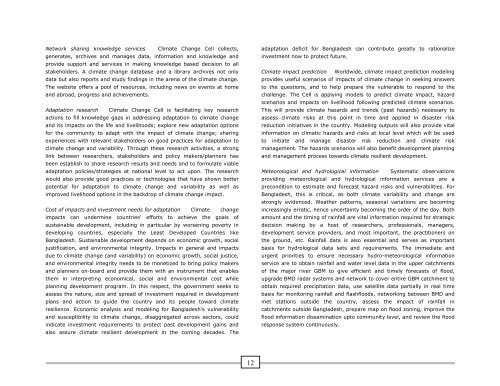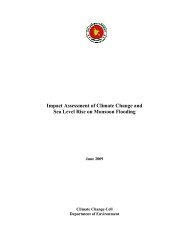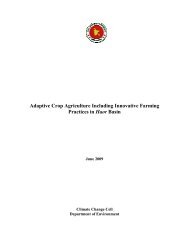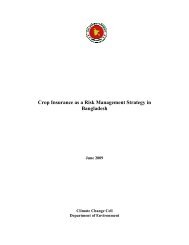CLIMATE CHANGE AND BANGLADESH
CLIMATE CHANGE AND BANGLADESH
CLIMATE CHANGE AND BANGLADESH
You also want an ePaper? Increase the reach of your titles
YUMPU automatically turns print PDFs into web optimized ePapers that Google loves.
Network sharing knowledge services Climate Change Cell collects,<br />
generates, archives and manages data, information and knowledge and<br />
provide support and services in making knowledge based decision to all<br />
stakeholders. A climate change database and a library archives not only<br />
data but also reports and study findings in the arena of the climate change.<br />
The website offers a pool of resources, including news on events at home<br />
and abroad, progress and achievements.<br />
Adaptation research Climate Change Cell is facilitating key research<br />
actions to fill knowledge gaps in addressing adaptation to climate change<br />
and its impacts on the life and livelihoods; explore new adaptation options<br />
for the community to adapt with the impact of climate change; sharing<br />
experiences with relevant stakeholders on good practices for adaptation to<br />
climate change and variability. Through these research activities, a strong<br />
link between researchers, stakeholders and policy makers/planners has<br />
been establish to share research results and needs and to formulate viable<br />
adaptation policies/strategies at national level to act upon. The research<br />
would also provide good practices or technologies that have shown better<br />
potential for adaptation to climate change and variability as well as<br />
improved livelihood options in the backdrop of climate change impact.<br />
Cost of impacts and investment needs for adaptation Climate change<br />
impacts can undermine countries' efforts to achieve the goals of<br />
sustainable development, including in particular by worsening poverty in<br />
developing countries, especially the Least Developed Countries like<br />
Bangladesh. Sustainable development depends on economic growth, social<br />
justification, and environmental integrity. Impacts in general and impacts<br />
due to climate change (and variability) on economic growth, social justice,<br />
and environmental integrity needs to be monetized to bring policy makers<br />
and planners on-board and provide them with an instrument that enables<br />
them in interpreting economical, social and environmental cost while<br />
planning development program. In this respect, the government seeks to<br />
assess the nature, size and spread of investment required in development<br />
plans and action to guide the country and its people toward climate<br />
resilience. Economic analysis and modeling for Bangladesh’s vulnerability<br />
and susceptibility to climate change, disaggregated across sectors, could<br />
indicate investment requirements to protect past development gains and<br />
also assure climate resilient development in the coming decades. The<br />
adaptation deficit for Bangladesh can contribute greatly to rationalize<br />
investment now to protect future.<br />
Climate impact prediction Worldwide, climate impact prediction modeling<br />
provides useful scenarios of impacts of climate change in seeking answers<br />
to the questions, and to help prepare the vulnerable to respond to the<br />
challenge. The Cell is applying models to predict climate impact, hazard<br />
scenarios and impacts on livelihood following predicted climate scenarios.<br />
This will provide climate hazards and trends (past hazards) necessary to<br />
assess climate risks at this point in time and applied in disaster risk<br />
reduction initiatives in the country. Modeling outputs will also provide vital<br />
information on climatic hazards and risks at local level which will be used<br />
to initiate and manage disaster risk reduction and climate risk<br />
management. The hazards scenarios will also benefit development planning<br />
and management process towards climate resilient development.<br />
Meteorological and hydrological information Systematic observations<br />
providing meteorological and hydrological information services are a<br />
precondition to estimate and forecast hazard risks and vulnerabilities. For<br />
Bangladesh, this is critical, as both climate variability and change are<br />
strongly evidenced. Weather patterns, seasonal variations are becoming<br />
increasingly erratic, hence uncertainty becoming the order of the day. Both<br />
amount and the timing of rainfall are vital information required for strategic<br />
decision making by a host of researchers, professionals, managers,<br />
development service providers, and most important, the practitioners on<br />
the ground, etc. Rainfall data is also essential and serves as important<br />
basis for hydrological data sets and requirements. The immediate and<br />
urgent priorities to ensure necessary hydro-meteorological information<br />
service are to obtain rainfall and water level data in the upper catchments<br />
of the major river GBM to give efficient and timely forecasts of flood,<br />
upgrade BMD radar systems and network to cover entire GBM catchment to<br />
obtain required precipitation data, use satellite data partially in real time<br />
basis for monitoring rainfall and flashfloods, networking between BMD and<br />
met stations outside the country, assess the impact of rainfall in<br />
catchments outside Bangladesh, prepare map on flood zoning, improve the<br />
flood information dissemination upto community level, and review the flood<br />
response system continuously.<br />
12





